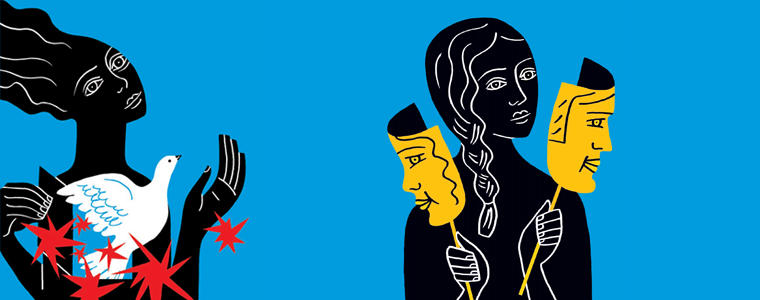By: Muhammad Rizwan Bhatti
Countering Violent Extremism (CVE) program focuses on community engagement as a strategic ploy for Law enforcement. It offers an alternative to kinetic and hard approaches to prevent terrorism. Extremism in Pakistan is an indigenous threat and has home-grown implications, therefore, social and psychological vulnerabilities need to be addressed. The efficacy of non-kinetic measures to combat terrorism in all its forms and manifestations is more persuasive and robust in mitigating the militancy and countervailing the radical narrative in society.
Pakistan witnessed a surge in terrorism after the catastrophic 9/11 incident. The counter-terrorism policy of Pakistan rests on the combination of Kinetic and non-kinetic means. Besides launching military operations such as Operation Enduring Freedom, Operation Al-Mizan( 2002 – 2006), Operation Zalzala (2006), Operations Sher-Dil, Rah-e-Haq, Rah-e-Rast (2007-2009), Operation Rah-e-Nijat (2009-2010). The formidable operations that decimated the militants were Operation Zarb-e-Azb and Raddal-ul-Fasad which helped in exterminating the terrorists. However, the fruits of these operations remained short-lived as the monster of terrorism has raised its ugly head again through sporadic terrorist activities in the provinces of KP and Balochistan.
Besides the employability of the military and police force, the state has also exploited the non-kinetic approaches to the wider level through employing de-radicalization, rehabilitation and counter-narrative rhetoric to combat extremism and militancy in its violent and non-violent manifestations. The redoubtable efforts of Pakistan helped in receding the terrorist events to a considerable level until 2017 but slashing the perennial and sustainable countering violent extremism measures caused a surge in terrorist events in the recent past. The bloodbath in Mastung and the suicide attack on the Rabi-ul-awal congregation is a grim reminders of the terrorism surge in Pakistan.
Terrorism is a natural concomitant of extremism that is an outcome of radicalization. Alex. P Schmid defined extremism as a “process characterized by an increased commitment to and use of violent means and strategies in political conflicts”. Equilibrium thinking is the anchor sheet of a balanced and sane personality. Radicalization can be defined as “moving away from equilibrium thinking”. The absence of “collective consensus” drives the individual towards extremism. A peaceful modus Vivendi of different sects having diverse ideological outlooks is a formidable example of collective consensus. Therefore, any individual who digresses from consensus is considered as extremist. However, there are multifarious reasons for the radicalization of individuals ranging from misinterpretation of religion, vengeance streak, identity crisis, desire for glory, monetary benefits and ideological derangement.
Counter-terrorism strategy rests on two major combating measures; hard CT and Soft CT. Hard Counter terrorism relates to capturing, disengaging, and decimating the terrorist networks and Soft CT measures refer to identifying, preventing, and pre-empting the violent extremism through rehabilitation, de-radicalization, rehabilitation, and pre-dominantly non-coercive means. There is a difference between disengagement and de-radicalization. Disengagement is the process of abandoning the militant way and being isolated from active combat and warfare. However, Angel Rabasa defined de-radicalization as “social and psychological process of changing an individual belief system, rejecting the extremist ideology and embracing the mainstream values”.
The eradication of terrorism requires both Kinetic and non-kinetic measures to obliterate the menace of radicalization and extremism in society. For this purpose, a multilevel approach needs to be established i.e. individual level, organization level and environmental level. Any individual who is radicalized needs to be rehabilitated by countervailing his toxic religious and ideological beliefs. Pakistan established different rehabilitation centers including Mishal, Sparley, Sabaoon etc to rehabilitate the moderate militants. Moreover, they engaged society and family members to give ownership and a sense of privilege to all rehabilitated individuals.
The organization’s transformation demands five prerequisites. They comprise: political will, relinquishing militancy and extremist violence, ideological reorientation and democratic values, internal cohesion and external recognition. Different terrorist organizations in Pakistan can be broadly divided into four distinct categories; Neo-Jihadists, Sectarian, Ethno-Nationalist and religious Nationalist. Jamat-ud-Dawa is a religious nationalist group, affiliated with Lashkar-e-Taiba (LeT) transformed itself into a mainstreaming political party Mili Muslim League (MML). However, MML failed to entrench itself into the political mainstream.
Countering Violent Extremism (CVE) at the environmental level requires defining the pragmatic counter-narrative to deal with militant ideology. There are three levels of narratives; Collective, ontological, and public narrative. Collective narratives develop in society through folklore and popular stories. It generates organically and thrives with the passage of time. The ontological narrative is engendered by an author and becomes a collective narrative when widely accepted by the general public. The public narrative holds the most importance and it is developed by any actor such as the Government, media, religious clerics, clergy and organizations. Pakistan encountered militancy and terrorism in society through Paigam-e-Pakistan, National internal security policies, National Action Plan and delegitimizing the violence as unlawful through the promulgation of the Protection of Pakistan Act (2014) and Fair Trial Act (2015).
Therefore, Pakistan needs sustainable and robust non-kinetic measures to root out the scourge of terrorism and militancy. The parochial and obscurantist thinking stinks the cognitive approach. Pakistan requires political will to deracinate the militancy. There is a dire need to counter the radical narrative that breeds militancy in society. Rehabilitation at the individual level, transformation of terrorist organizations, and building of sensible counter-narratives to make a wholesome environment for better coexistence are essential to render society peaceful, inclusive, tolerant, and free of extremism.
The writer is a Ph.D. scholar. He can be reached at rizwanbh79@gmail.com

